#BUCPUA Professor reveals how to land the best job ever

On September 29, more than 250 policymakers and job seekers gathered at the 8th Annual Massachusetts Green Careers Conference, held at the DCU Center in Worcester. BU City Planning and Urban Affairs (BUCPUA) Adjunct Faculty Professor Eugene Benson, JD addressed the entire crowd and also led a smaller breakout session. Benson compelled the audience to pursue the best job ever – municipal conservation agent.
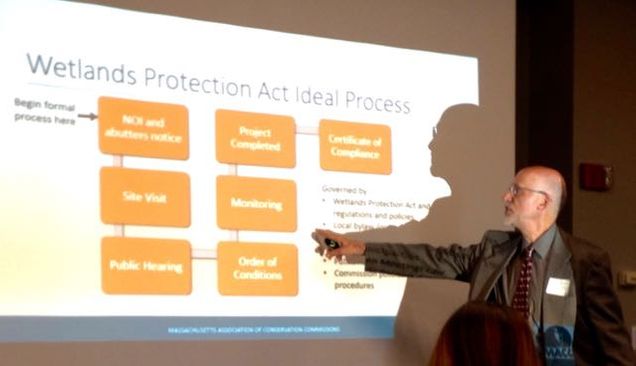
Passionate degree candidates in the #BUCPUA Program assess the social contexts and economic structures that influence the management of fragile open spaces, such as wetlands. The #BUCPUA Program provides students with high-demand tools and pertinent skills to excel as environmental planners. Relevant course offerings include UA 521 Environmental Law, UA 617 Applied Sustainability, UA 654 Geographic Information Systems for Planners, and UA 629 Urbanization and the Environment. Students can complement their Master of City Planning or Master of Urban Affairs degree with a Certificate of Applied Sustainability.
Aside from teaching law to #BUCPUA students, Benson is the Executive Director of the Massachusetts Association of Conversation Commissions (MACC). MACC’s tenants include advocacy, education, and conservation, and the state leader in providing education and training to more than 2,500 conservation commissioners. Benson urged participants to fully grasp the wetlands crisis in the United States, as half the country’s wetlands have disappeared since settlement by Europeans. This loss of wetlands has exacerbated flood conditions, particularly in states like Iowa, which has lost 80 percent of its wetlands. Wetlands perform invaluable functions by buffering floodwaters, capturing carbon, and providing habitats that sustain biodiversity.
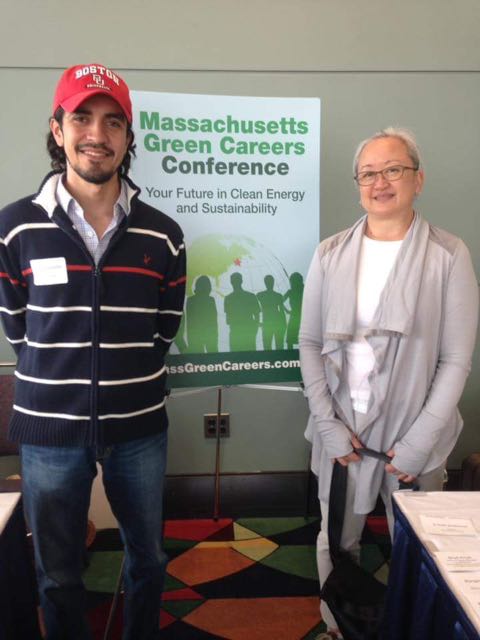
As municipal conservation agents, citizens have a direct stake over the protection and management of these vital, yet vulnerable, areas that envelop land, water, and biological resources. Conservation agents are full-time positions that support and guide all-volunteer municipal conservation commissions. On average, volunteer conservation commissions experience a 10 percent annual turnover, which underscores the value of a municipal conservation agent who can create a stable foundation for long-term planning and land management.
At the state level, the Massachusetts Department of Environmental Protection, the Massachusetts Department of Conservation and Recreation, and Massachusetts Regional Planning Agencies also offer full-time positions that directly influence the protection of open spaces. Qualifications required for state or municipal conservation agent positions include a thorough understanding of environmental law and superb communication skills that conform when influencing different stakeholder groups. Organization skills, creativity, and flexibility also help conservation agents preserve open spaces against myriad external factors, including impacts of climate change and ongoing economic development.
Aside from teaching law in the #BUCPUA Program, Professor Benson also instructs courses at the BU School of Public Health.
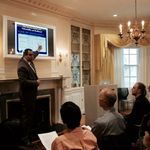
#BUCPUA Hosts Actionable Sustainability Symposium on Technology, Policy and the City
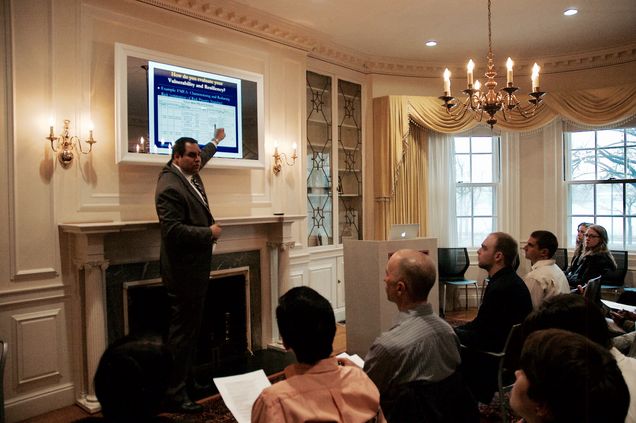
On Friday, April 21, Boston University Metropolitan College’s City Planning and Urban Affairs students, faculty and alumni gathered at the Initiative on Cities brownstone at 75 Bay State Road for a full-day Symposium, titled “Technology, Policy and the City.” The event was co-sponsored by the Initiative on Cities and the Urban Planning Association. It included a lecture and workshop led by Dr. Ramon Sanchez, Director of Sustainable Technologies & Health at the Harvard Center for Health and Global Environment, a keynote lecture by Nigel Jacob, Co-Founder of New Urban Mechanics for the City of Boston, and a panel discussion moderated by Dr. Madhu Dutta-Koehler, Associate Professor of Practice and Director of BU’s City Planning and Urban Affairs Program.
“It was exciting to be part of the symposium to talk about the intersections of technology, policy and sustainability. There was a great turnout by members of the BU community including students, faculty and alumni who were interested in these issues. The different speakers were able to provide diverse perspectives on the set of topics, whether their background was local government, the non-profit sector, advocacy work or running programs in a university setting,” said panelist Erica Mattison, Legislative Director of the Environmental League of Massachusetts remarked. Mattison spoke amongst panelists Dr. Joshua Hassol, Technology Policy Analyst at the U.S. Department of Transportation and adjunct professor in BU’s City Planning and Urban Affairs Program, Bradford Swing, Director of Energy Policy and Programs at the City of Boston, and Brian Swett, Director of Cities and Sustainable Real Estate at Arup.
Dr. Sanchez’s lecture “Climate Change Preparedness Vulnerability Assessment and Risk in the Built Environment” reminded students about the climate change challenge, mitigation and adaption projects, and the concepts of risk, vulnerability and resiliency. The subsequent workshop on Dr. Sanchez’s development based off the U.S. military’s vulnerability assessment and risk management tool, the Failure Mode Effects & Analysis (FMEA) for climate change preparedness in the built environment, drove home the urgency to mobilize communities to characterize, reduce and manage risk at every stage to mitigate/adapt to the climate change challenge in sectors ranging from healthcare infrastructure, housing and urban public spaces, to transportation and communications’ systems. The FMEA chart assigns a Risk Priority Number (RPN) on a 1 to 1000 scale based on an evaluation of the severity, occurrence and detection numbers of different scenarios. “What if I-90 or the Park Street T-station floods?” Dr. Sanchez asked, urging the audience to imagine scenarios close to home. He spoke of the difficulties of finding the pain points of cities or “hotspots,” and explained how the FMEA can suggest corrective action for scenarios with a RPN above 150.
“Political will is the scarcest resource we have right now . . . we have the solutions, we just have to change the language,” Dr. Sanchez claimed. He then spoke of his experience of requesting city planners, managers and mayors to sponsor and train 300 people in various communities to learn how to use the FMEA to create climate-resiliency solutions and cost-reduction opportunities. He reiterated that the process must be democratic to be effective, involving the entire community. At the end of the workshop, Dr. Sanchez proposed initiating an online joint certification program between BU and Harvard.
“It’s not technology instead of something else . . . technology allows people to use a different part of the brain,” social entrepreneur Nigel Jacob from the City of Boston’s New Urban Mechanics
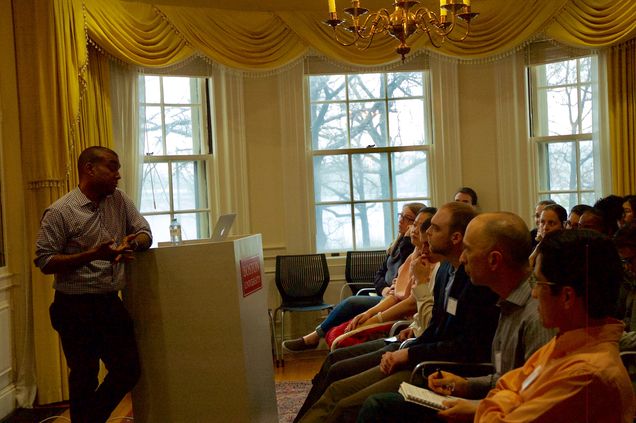
contended in his lecture. New Urban Mechanics has been working on a plethora of initiatives since its installation to define new methods of human-centered design and thinking. One idea comprises of helping change public school registration by creating an interactive website for parents, while another idea, the “Boston 311” app, allows residents of the city to take pictures of problems and send them immediately to a response team. Jacob also shared that after working with a research group in Emerson College, New Urban Mechanics realized that aggressive behavior in town hall meetings happen due to lack of information amongst the public, which prompted them to create a game to communicate issues in small groups. The Tiny House / Urban housing Unit project that was open to the public demonstrated to Bostonians that bigger is not always better, while the living draft of the Smart City Playbook laid out what works and what to stop doing in Boston in a humorous fashion. These programs embody the principle that psychology and technology are important, and together they can solve “real problems for real people.”
“Innovation is not technology . . . it’s not data, it’s always about people,” Jacob stated. He explained how “smart cities” must optimize for impact on people using technology to build compassion based on the criteria of a project’s potential for impact, testable ideas and their potential for scale. Through his lecture, Jacob illustrated how his job is “to invent the future of city services” by asking questions to help leverage and tackle big issues ranging from multigenerational poverty to climate change.
The third section of the symposium kicked off with Brian Swett’s presentation on Arup, an independent firm of designers, planners, engineers, consultants and technical specialists. Swett introduced the broad portfolio of projects in the sustainability-policy-technology-interface that Arup is working on—specifically the Digital/Smart City research publications and their work in the transport, utilities, cities, property, sports and major events and generic built environment sectors. Swett emphasized the importance of restricting barriers in the developing world, so technology does not outpace policy.
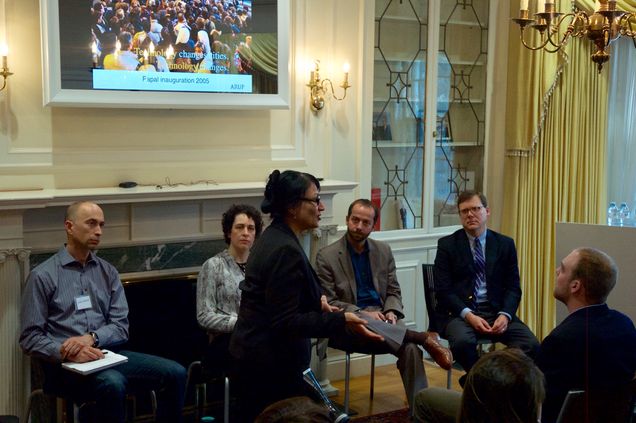
“It’s wonderful to have BU help its students understand what it takes to develop innovation in the real world. It was an honor to be with my colleague Nigel Jacob, who has done such a remarkable job in the Mayor’s office of New Urban Mechanics. I was very happy to share my experience developing district energy micro-grids, creating public-private partnerships and discussing what it will take to build a climate-ready Boston,” said Bradford Swing, who has 22 years of experience working in the municipal government shared.
Swing also commented on the possibility of creating a multi-user micro-grid with integrated energy, transit, water and communication planning in South Boston’s Raymond L. Flynn Marine Park through collaboration between Boston City Government and utility companies such as AECOM, General Electric and Axis Engineering. He remarked on the 2014 policy workshops and MIT Sustainable Design Lab’s 2016 Boston Community Energy Study that produced city-wide results on cost/benefit analyses and the total capacity for energy supplies. Some challenges include deploying local generation and storage, developing smart-grid and smart-building technologies and creating islanding capability for critical loads. Developing partnerships to catalyze cash flows will help capitalize on initiatives, and that is what Boston needs to understand going forward in the face of the technology era.
“We need to enact legislation to authorize city government to procure the public-private partnership necessary to work with a private developer to design, build and operate the district energy micro-grid for us. We have authority from the Boston Planning and Development agency to issue that procurement, but we now need Boston City Council to approve a home-rule petition, a piece of legislation that the state legislature needs to pass to allow Boston to do something specific to Boston. . . . I would hope that we would have a district energy micro-grid in the ground in a few years,” Swing said.
Technology Policy Analyst for the U.S. Department of Transportation and adjunct professor at BU Dr. Joshua Hassol, commented on transportation during the symposium. Transportation is the fastest growing industry that is emitting carbon dioxide. Dr. Hassol elaborated on the three levers of action applicable to decreasing greenhouse gas emissions—1. the carbon content of fuel, 2. fuel efficiency standards and carbon pricing to encourage efficiency through market systems and 3. reducing the amount of “fossil-fueled” travel through electrification of short distances and re-investment to allow different kinds of travel. The panelists then directed the discussion to various “future-proofing” ideas for climate change and equity, project-based hypotheses and policy developments ranging from the possibility of driverless vehicles in relation to the problem of smart-phone and mobility access, to home energy audits at the time of sale, to the potential decommissioning of fossil fuel electrification by 2030.
The last panelist speaker, Erica Mattison, shared her experience as Legislative Director of the Environmental League of Massachusetts and urged the audience to set social goals: “As a non-profit, environmental advocate, the focus of my remarks was on the importance of activism to help shift our society swiftly toward resource decentralization, which will democratize everything from water and food access, to our transportation, to where our energy comes from. By organizing and advocating, people can influence policies and make that shift happen sooner, making our communities more resilient and improving overall health and equity. Access will be less centralized and the control over resources that we depend on, will be more in the hands of people on the local level and less in the hands of large corporations.”
“If you want to have an impact, you need to know who represents you on a federal level, state level and on a local level. You need to know who they are and start a relationship with them so they know who you are and so you can build a positive relationship. They will be responsive and look to you for your own expertise and your own thoughts on issues once they see that you are passionate and knowledgeable. You can become a reliable resource, especially on the local level,” Mattison said.
Swing also gave some parting advice to students: “Any opportunity to intern at a government office will certainly give a front-line view of the actual challenges of representing a community and ‘innovating’ innovation. It’s amazing to me how much coursework is available to students in environmental studies and energy systems, and in sustainability in general. The emerging academic world that is preparing students is very welcoming of development, one that has happened since I was the age of the students that I have met today. Take advantage of the coursework available here but don’t be frightened of obtaining a liberal education. I am currently Director of Energy, Policy and Programs to the City of Boston, but I studied Medieval History and became a lawyer, so I think it’s important to learn how to learn, as much as it is important to focus on specific subject matter expertise.”
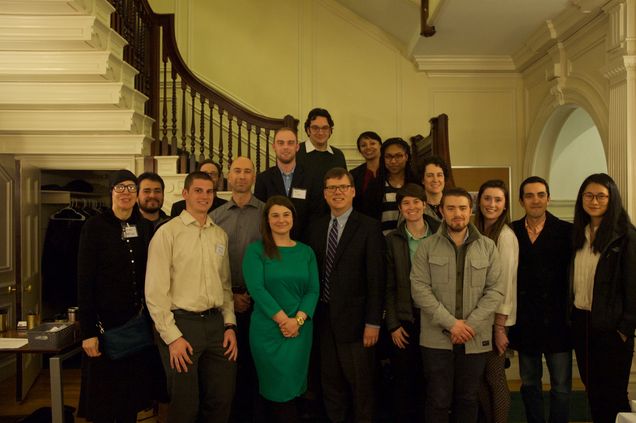
In summary, “Technology, Policy and the City,” was a massively successful event on the part of the Urban Planning Association, the Initiative on Cities and the City Planning and Urban Affairs Program at BU’s MET College. Each of our speakers was informative, interesting and challenged us to think critically about the intertwined relationships between technology, policy and their impacts on cities now, and in the future. Everyone in attendance gained firsthand knowledge on the different approaches they can apply in their own lives, in their communities, at the local/state/federal government levels and with private industries. On behalf of our department, thank-you to our speakers and audience for joining us, and thank-you to the Initiative on Cities for hosting us and making this event possible.
- Savannah Wu, CAS ‘19, Karol Montilla, CAS ‘19, Cecilia de Almeida, CAS ‘19 and Fiona Coughlan, MUA ‘18

#BUCPUA Professor O’Connell Hosts Book Lecture
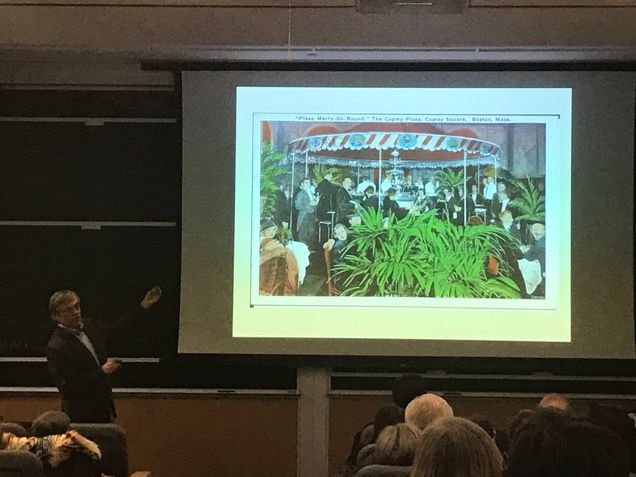
On Tuesday, March 21, #BUCPUA Professor Jim O’Connell held a lecture on his newly published book Dining out in Boston: A Culinary History hosted by the BU Wine and Food Program. Surrounded by food and history enthusiasts alike, O’Connell used historic menus and photos of restaurants to detail Boston’s culinary past. The book has a focus on the culinary history of Boston and looks at the several different aspects that were particular to the dining out experience, starting from the 18th Century. It is a guide to restaurants that no longer exist, but its chief importance lies in its ability to trace a historical narrative of the preferences and eating habits throughout time. It gives an insight to the different dishes and a restaurant’s ambiance and clientele. By looking at the decorations and the several different recipes, it is possible to see the changes that have occurred in American culinary culture. Throughout the book, there are several examples of restaurants that made history during their time, for instance, the Lafayette Dinner, Exchange Coffee House in 1824 as having the first printed menu in America or the Parker House in 1846. Professor O’Connell emphasized how in the beginning, the dining out experience was not as focused on the culinary as it is today. When dining out started becoming popular, people were a lot more interested in the experience of it rather than the quality of the food. Having large meals was uncommon, consisting mainly of fruits and nuts. As time went by, dining out started becoming a more well-rounded experience, one where you would expect good food, quality entertainment, and a great ambiance. Professor O’Connell phrases it best: “it has been not just about the food but also about restaurants as cultural institutions and the regional culture they have helped cultivate”. Restaurants are not merely about the food or the ambiance, but rather the experience that is dining out.
-Cecilia de Almeida, CAS ‘19
Welcome to the Future; Input Your Data Here
For many years, city planners collected a small fraction of information from residents to design the best solutions aiming to maximize the liveliness of cities while tackling the most urgent needs in the community. Nowadays, with the technological boom that we are currently undergoing, it became even easier to access data that could increase the standard of living of many residents’ lives. City planners and designers have more access to information than ever before; the question now becomes: what is the most useful and proactive way to use the information that became available with the touch of a finger?
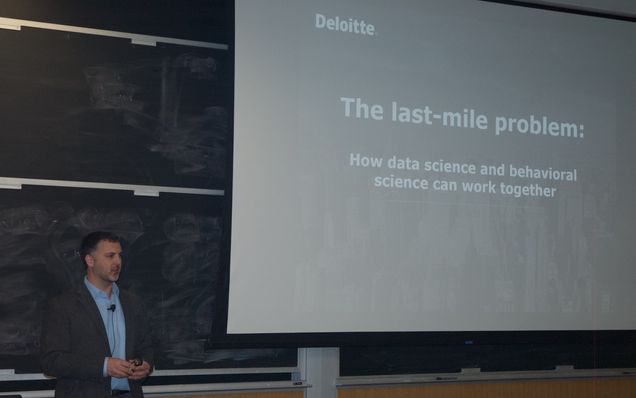
On Monday, March 20, Boston University’s City Planning and Urban Affairs held a Keynote Lecture that informed students about the availability and integration of data in urban development. The lecture was given by Michael Greene and Natalia Ochoa, who are data scientists with Deloitte Consulting. Greene and Ochoa help public and private sector organizations use scientific analytics to transform the relationships with customers, and most importantly, the optimum use of data in both the private and public sector. Surrounded by a large crowd of students and faculty, predominately from the Metropolitan College, Greene began by emphasizing the power that data collecting technologies hold, and how it is imperative to use this data available in the most efficient ways possible to create smarter cities and less waste. He also emphasized the new relationship that must arise between urban planners and technologists to ensure the smart use of databases and a more well-rounded understanding about the different motivations that lead people to act and make decisions. “I truly enjoyed the connections discussed between data analytics and human behavior,” said Fiona Coughlan, a Master of Urban Affairs candidate. “Recognizing and developing those relationships are crucial to the field of urban and regional planning in the 21st century.”
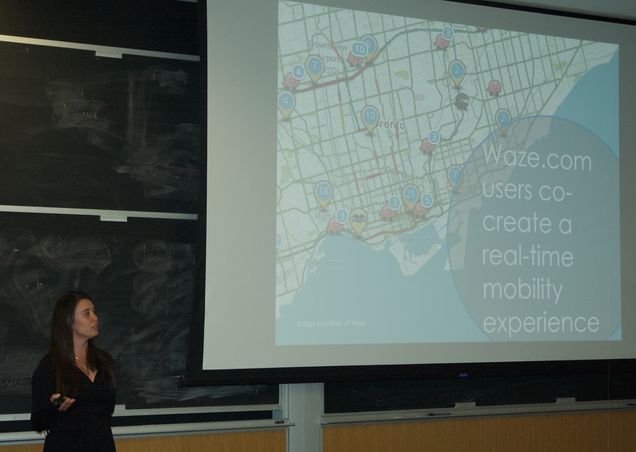
Greene and Ochoa explained how digital, data and design – the three D’s – are the building blocks of any big transformation today. In order to ensure smarter and more efficient cities, the digital aspect of transformations allows for greater participation of citizens and puts the onus of actively engaging on the individuals rather than government entities. By going digital, it makes the collection of data around the city a lot easier, as there is a much more immediate and accurate collection of data as it allows citizens to participate actively in the maintenance of their city. But in order to ensure that both data is being collected in an efficient manner, the design of these digital tools must be developed in a way that us human-centric. They must nudge people in the right direction. During the Q&A section of the lecture, students voiced their concerns about how the use of data could be misused and their hesitations of offering this information without the guarantee of it being used for the right intent. Greene and Ochoa guaranteed that it was the responsibility of the companies and organizations involved to emphasize and specify what the data being collected is used for. The more transparency there is between companies and individuals, the better the collection of data will be.
- Cecilia de Almeida, CAS ‘19
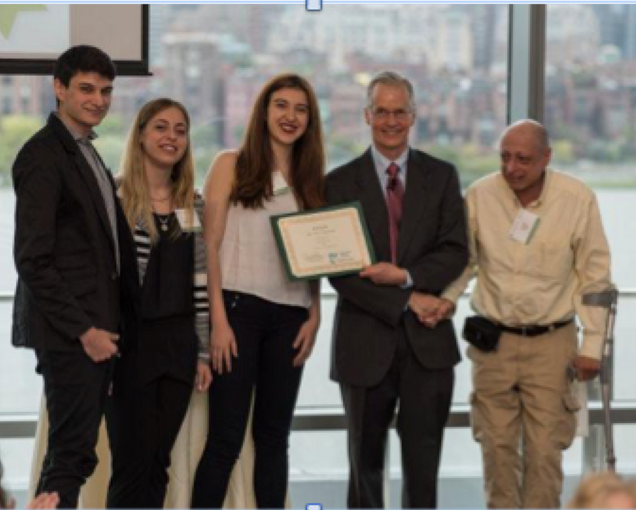
Climate Change Awareness Project by Two BU Online Course Facilitators Won the MIT Climate Colab 2016 competition in the Industry Category
Many 20-year olds dream of trotting the globe, winning climate change awards, and meeting with their country’s leader to discuss implementation and deployment of their proposed projects. Led by BU online facilitators Eduardo Fracassi and Fabian Szulanski, the young Kiri team from the Instituto Tecnológico de Buenos Aires (ITBA) won the MIT Climate Colab 2016 competition in the Industry Category.
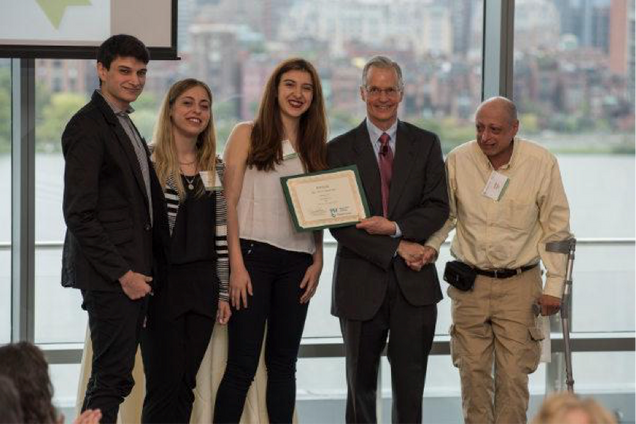
Marco Esposito, Aylin Vazquez Chenlo, Marina Fuster (left) and Eduardo Fracassi (right) from the Kiri Team receive winners’ diploma from MIT Prof. John Malone (with the diploma in his hand)
The Kiri team was led by Eduardo Fracassi, a BU Online Facilitator. It was comprised of 9 undergraduate students and 12 professionals. Fabian Szulanski, a BU Online facilitator, is one of those 12 professionals. The students’ work has created ripple-effects across the world, garnering serious consideration from policymakers and forging partnerships with universities, governments, and industry professionals alike.
Members from Kiri team and Eduardo Fracassi were interviewed by Courtney Thraen, a former assistant program coordinator of the BU City Planning and Urban Affairs program at Boston University. They told Courtney their success story. Here is picture of the meeting.
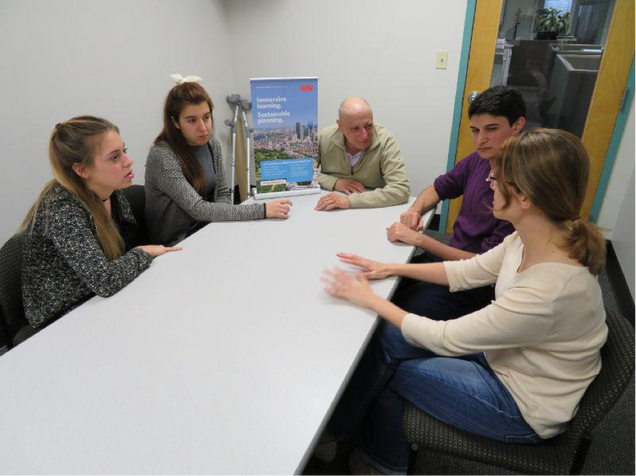
Former BU’s Assistant Program Coordinator Courtney Thraen (far right) interviews Eduardo Fracassi (center) and Kiri team members. From left to right: Aylin Vazquez Chenlo, Marina Fuster, and Marco Esposito (between Courtney and Eduardo)
Imagine the impact created by setting air conditioners to no less than 77 degrees Fahrenheit. Using the proof-of-concept model, the Kiri team developed an integrated scientific, economic, and policy approach to implementing and deploying minimum limits on air conditioners. Through an intermediate intelligent controller, older units can be adapted to regulate room air temperatures at 77 degrees Fahrenheit or above. Concurrently, the 77 F degree minimum temperature will also provide comfort, as the intermediate intelligent controller will regulate relative humidity to prevent the “stuffy room” phenomenon.
The judging panel at the MIT Climate CoLab was blown away by the startling impacts of the Kiri’s team simple, yet effective, plan to regulate air conditioner temperatures. The Kiri team’s detailed proposal paid high dividends, as they won the 2016 Judge’s Choice, Impact, and Popular Choice in the MIT Climate CoLab in the Industry Category. Here is a link to their detailed proposal:
https://climatecolab.org/contests/2016/industry/c/proposal/1329804
During their presentation, the Kiri team described the results of their study, which showed that regulating air conditioners to no less than 77 degrees Fahrenheit results in a global greenhouse gas savings of roughly 194 million metric tons of CO2 per year, which equates to 327 Twh energy savings. At 90 USD per megawatt, this would equal 29,500 million USD per year, which exceeds the GDP of countries like Paraguay, Latvia, Cameroon, Trinidad and Tobago or Bolivia.
25C (77F) proposal for the MIT Climate Colab 2016 competition by ITBA'sKiri Team
Two minute video explaining Kiri’s (25C/77F) proposal.
When the news spread in Buenos Aires - that Kiri team’s proposal had won the MIT Climate CoLab 2016 competition in the Industry category - they were interviewed by many radio stations, 5 different TV channels, and most of all important Argentine newspapers. The Kiri team was welcomed and received by the President of Argentina, Mauricio Macri, who displayed genuine interest about the potential for lasting, powerful impacts of their proposal. He even tweeted about it (in Spanish)
https://twitter.com/mauriciomacri/status/766747583196848129
The Minister of Environment and Sustainable Development, the Argentine Congress, and the Buenos Aires Legislature are formally planning to recognize the team’s efforts.
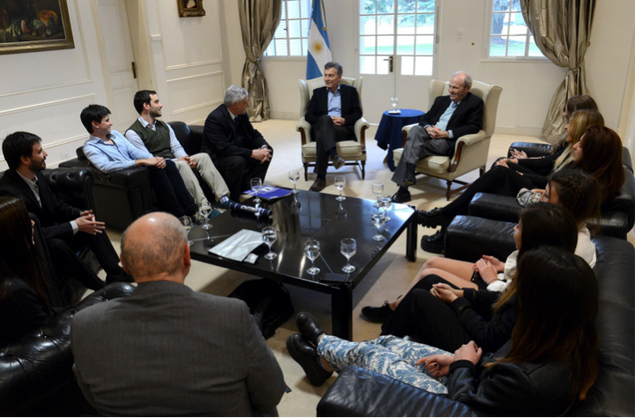
9 students of the Kiri Team with Argentine President Mauricio Macri (besides the Argentine flag). At his left, Jose Luis Roces, Rector of ITBA, and at his right, Juan Carlos Masjuan, ITBA’s President of Governance Council.
Already armed with scientific and economic data, the Kiri team is now equipped to face policy challenges head-on in a variety of local contexts around the world. For instance, Italy has already passed and implemented legislature to limit air conditioner minimums at 24 degrees Celsius (75 degrees Fahrenheit). Aside from substantial monetary and greenhouse gas savings, the Kiri team re-iterated the savings difference per degree, stating the 77 degrees provides comfortable temperatures especially when controlling for humidity. Based on the relative comfort produced from their model, the Kiri team members resisted an incremental degree change policy approach, such as starting at a 72 degree minimum and gradually moving up to a 77 degree minimum.
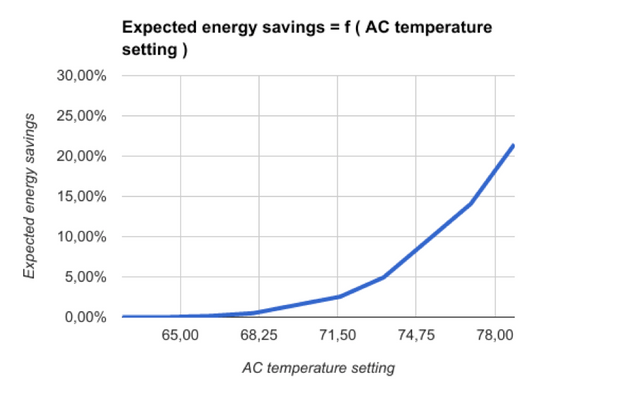
Expected energy / monetary savings in relation to AC setting temperature.
Finally, Kiri team’s proposal has been implemented by the Argentine government, however for political reasons at 24 degrees Celsius, not 25.
Here is a link to an article in a leading Argentine newspaper, (in Spanish)
http://www.lanacion.com.ar/1961581-lanzan-un-plan-de-ahorro-para-acotar-los-cortes-de-electricidad
The government set the temperature of its buildings at 24 degrees Celsius during the 2016 / 2017 southern summer and ran a media campaign through broadcast TV, cable TV, and social media, urging people to set their air conditioners at 24 degrees Celsius (75 degrees Fahrenheit) during the summer.
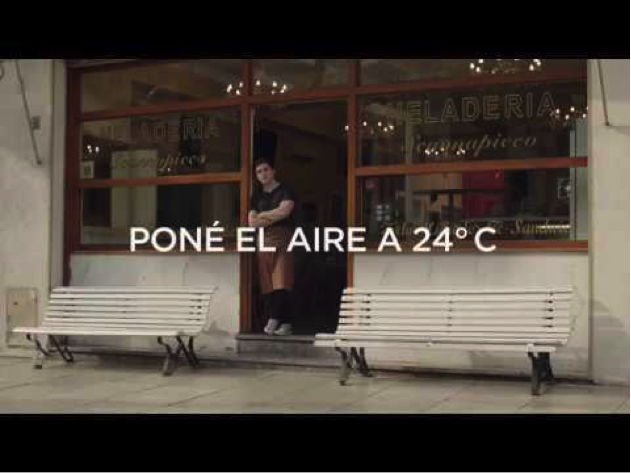

Pictures used in social media campaign (in Spanish) by the Argentinian government based on Kiri’s team proposal.
These videos are part of the Argentine government’s PR campaign to apply Kiri’s team proposal (in Spanish):
- https://www.youtube.com/watch?v=sjkWV9JCmeA&feature=youtu.be
- https://www.youtube.com/watch?v=0bHZiQ4gMDY
- https://www.youtube.com/watch?v=lnBpHx49lO4
- https://www.youtube.com/watch?v=ABM6MW9dkH4&spfreload=5
- https://www.youtube.com/watch?v=EVaS8gp69Q4
- https://www.youtube.com/watch?v=sjkWV9JCmeA
- https://www.youtube.com/watch?v=PhKUZ7GSLHg
- https://www.youtube.com/watch?v=UBgLQiK5sxg
In Closing
The government reported the success of the campaign was evidenced through a marked reduction of blackouts in Buenos Aires city, and saving energy, and money, because in Argentina the government subsidizes the electrical energy bills by 70%.
Eduardo Fracassi and Fabian Szulanski are online facilitators at Boston University's MET College, they have helped this initiative by assuming different roles for over a decade. These roles mostly include Online Facilitators, but they also serve as Lead Facilitators and Advanced Instructors.
Both Eduardo and Fabian are willing and able to collaborate on current and future Climate Action Plans at BU.
A special thanks to San Chee, Lecturer, BU MET College, Administrative Sciences Dept, who helped arrange a meeting with Courtney Thraen at BU. Courtney also wrote part of this article.
I hope that you enjoy it!
Cheers,
Eduardo Fracassi and Fabian Szulanski
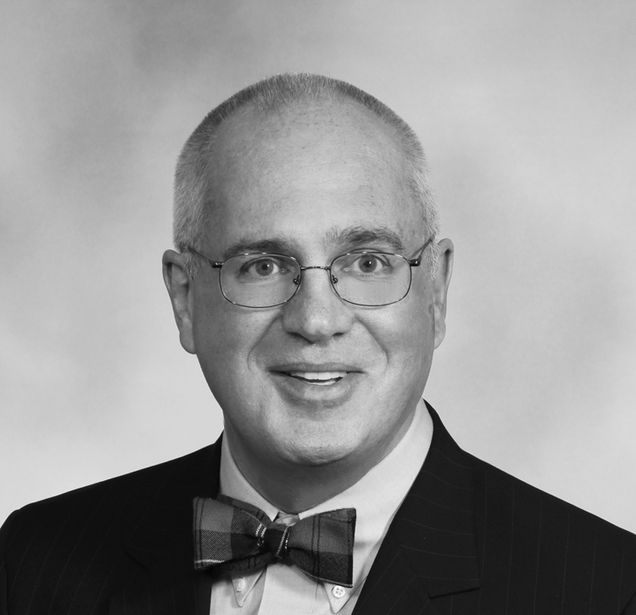
The Last Semester: An Interview with Stephen L. Delaney, MUA
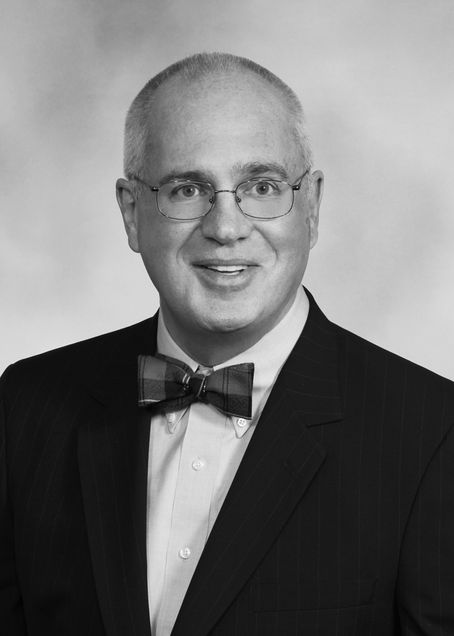
Professor Stephen L. Delaney has been a faculty member in the City Planning and Urban Affairs program since 2006. His expertise lies in municipal management and finance with over 40 years of experience. After eleven at Boston University, Professor Delaney says goodbye, and shares some of his experiences, lessons, and final thoughts.
Andrea: Tell me a little a bit about your background. What drove your interest in municipal management?
Delaney: My undergraduate work is in political science with minors in history and secondary education at Salem State. I was elected to the Peabody School Committee when I was 20 years old. I was the youngest ever elected. I enjoyed it, but I realized I could make more of difference in an appointed role than in an elected role. I wasn't as comfortable as an elected official. That was kind of the start of it. My first job was an intern with the town of Danvers where I retired from. I'm a product of the sixties I guess you could say, and throughout my whole career it's been about trying to help the people of the community we serve and that's really been the gut feel for everything I've done in my career, which has been pretty neat. Not always without low points or stress points, but at the end of the day, it's the local government that makes the difference. Then I ended up at BU, and I was looking for a graduate program because I really wanted to teach. I ended up discovering the program at MET in Urban Affairs, and not only did it provide a skill program, but it also was a thinking program, and I think that's one of the huge pluses of the program here. Whether it's in planning, urban affairs or criminal justice. I've tried to do that with my students over the past 10 years. It's about challenging them to think about what they see. What is it that I'm seeing and hearing and how do I relate that to the community? How can I better serve the community? That's what has driven me. I graduated from MET in 1989. The program was a lot different back then. It was a good program then, it's a great program now.
Andrea: Tell me a little about your teaching experiences at BU. What were some of the positives and what were some the challenges? What do you like about the City Planning and Urban Affairs Program?
Delaney: I've been teaching part-time at the college level for 27 years. I started in 1990 at Nichols College. I love the classroom. Over the years I've probably taught at ten different schools; history, political science, and ten years ago I had an opportunity to come here and it's been great. One of the strengths of the program is the practitioners that teach because we bring our field experience into the classroom, and I've been doing that and it's been wonderful. I think the students really latch onto that because we're out in the field, we're out in the day-to-day operations of our profession. There's been a component of my course which students always cringe on, where I require them to bring in a news articles that are related to the course. Whether it’s finance or urban management, there's a ton of stuff every week to talk about. The courses usually have two or three pieces. There's the core piece that helps them understand how things works. The mechanics of an urban system and urban city. There's the piece that say how does it work in practicality and reality. What are the things that influence it. You can think of the current political climate, one of the topics of this class this semester in urban management, was how do we respond to our community or work with our communities in a climate where racial divides are now more pronounced. Regardless of who's in the White House, the tone of this nation is terribly divided. How can we prevent that from becoming the catastrophic fires of the 60's that I lived through. There's a lot more firearms out there today. There's a lot more destructive nature out there today. That’s an example of as a manager, I'm looking ahead saying, do I need to anticipate something, and how can I best work with the community to make sure we're not a tinder box? How can we improve the lives of the people in the community? I try to bring that stuff in.
I think the students are wonderful. Our students here at BU are a wide range of students. We have students from foreign countries who don't have a clue as to how America works. We have students from America who have some idea, so how do you balance that out and give them all something beneficial. But they're talented, eager, and they're wonderful. One of the greatest joys for me is to have a student come up at some point and say can you write a recommendation for me for a school? I'm looking at going on for my masters, or I'm looking to do something else in the field for a job, or I'm looking for a job, would you serve as a reference. That really makes you feel good. The students have been great. That's why I'm here. That's the whole point of the program.
Andrea: Can you talk a bit about your teaching style and what you enjoy the most about teaching?
Delaney: Well it's changed a lot over the years. Back 27 years ago we didn't have computers, so there's a lot more visual aids, there were a lot more overheads. A three hour class can be challenging just by the nature of the structure, so you try to mix it up a little bit. You strive for greater student involvement. You strive for variety in presentation. I think technology has been one of the biggest changes and a plus in terms of how I approach the classroom. I love technology.
Andrea: In addition to your teaching, you’re also an expert in your professional field. How do you feel your work dovetails into your teaching?
Delaney: I've always strived to be the best professional I can be, and not in a type A way, but just in terms of what's the best I can do for the community I work for. What can I learn from it. What skills can I enhance, and it's been a life-long learning process for me in terms of how I've changed. At the end of the last couple semesters, the last class I'll do something about the things I've learned in my career and one of the key ones is communication. Covey writes in his book about seek to understand and seek to be understood. It's about good listening and in communities and community service you have to be a good listener. What is it they're trying to tell you about a particular issue? What are they really upset about? I find it particularly with senior citizens who come into my office who are incredibly upset about things that are often times because the little issue has become gigantic, and if you can sort of talk them through it and listen to what they have to say, you can help them and that’s a huge skill. I try to be the best I can be, and I try to bring that into the classroom. Things are rarely black and white. The facts you and I have today may look different tomorrow. It’s always like sorting through fact and fiction. Sorting through the emotions and trying to get to the fact of the bottom line. Detective skills are part of it.
Andrea: What is the most important lesson you want students to come away with in regards to their chosen profession? Similarly, if you could give a last lesson, what would it be?
Delaney: I was brought up in a family where work wasn't meant to be gratifying. It was you do whatever you're supposed to do, it doesn't matter if you're happy or not, and I learned early in my career that that is deadly for me, so I guess one of the lessons is be comfortable, be good with what you do, and be happy in your job. Find something that makes you feel good because you will transmit that good feeling to those that you're trying to help. I think that's an important lesson. Don’t do it just because it's a job because then you're not going to do a great job. Be happy with your profession, feel good about it, whether it's planning or general management or finance or whatever it is. Understand who you are as a person, and bring that with you to the job.
Andrea: What is the most important thing students have taught you?
Delaney: I wasn't sure how to answer that one. I could flip this around a little bit. Learning didn't come easy for me. I always struggled to stay focused. I struggled to achieve. I found it to be a tremendous struggle, so I'm very much in touch with or in tune with watching my students carefully to see how they're doing because I can identify, and I can pick out the ones that are struggling. I try to take the stress out of the class. My goal is that after the class is done, that six months later you remember something. If I make it too stressful, you're not going to remember anything. So if you can take the stress piece out and minimize it, then the learning component can really develop and grow. I taught a history class one time and one of the students wrote to the dean and said I never knew history could be fun, and if you think about history and having the word story in it, it's about how you tell the story. It's the same thing in urban management or finance, it's about how you tell the story. How you present the material. I want them to get excited about the topic, as much as they can, about say finance. But they will understand the mechanics of it in a way they'll retain.
Andrea: What are your hopes for future students and practitioners?
Delaney: I think the continuation of the kind of progress I've seen here at BU, the department, Dan has done a wonderful job leading this group. Madhu has been a great addition. They strive, including the MET administration, which has been very supportive. The MET college approach to learning has been wonderful, and I've only seen it get better in the years that I've been here. There's an excitement and there's a great sense of learning and that's what it's all about. I've never lost the excitement of the start of the semester in September, and coming to campus a couple days ahead and watching the students assimilate into the programs, and watching the cook outs behind the chapel as they try to build some of that teamwork. Trying to help some of my students assimilate that come from foreign countries and are completely lost. Trying to help them understand that the university is only as large as their small dorm unit or their department. To use that as a base. Don't get overwhelmed by the size of the place. Use your department as your family and build from there. Think of your department and your roommates as your family, and as your family unit gets stronger, you'll branch out. It's just like time management. If you try to solve the 30 issues on your desk, you're going to get nothing done because you’re going to get overwhelmed. So keep it small.
Andrea: I understand that this is your last semester teaching at BU - Any future plans, projects, or initiatives you will be working on?
Delaney: No, it's pretty flexible. I'm not sure what's ahead. I know my photographic art is in the future. I did a big project last summer with the state of New Hampshire. I volunteered to do a photo essay of all eleven New Hampshire fairs last summer. I wanted to see if I could capture the "flavor" of New Hampshire through the fairs. The board of directors looked at me like I was crazy, and I said yes, and at the end of the day, I'll give you copies of everything. I'm not looking to do this as a commercial thing, so I took 3 thousand images over the course of the summer. The kids are what caught me. I'd see some of the same kids at each fair through the whole summer, and you'll recognize some of the same faces, and it's a culture. It was an extraordinary experience for me, and I would like to do something like that, so maybe there's something else like that that I can do this summer. I'm not sure. Is there more teaching in the future? I'm not sure.
Andrea: What currently motivates you, or is your passion?
Delaney: I want to be the best I can be in life. One of my goals is if I'm 85 and I'm lucky to live that long, and I'm sitting on my porch in my rocking chair, I want to be able to say that was pretty good. We did a good job. I'm known as a glass is full-half guy. I always try to see something good out of something. That's just who I am. I taught at a community college several times and it's a special environment. For many students, it's their last stop to see if they can succeed, and whether they'll rise to a different level of success. We had to work harder, and I remember when they would recruit for instructors, it talked about that environment where they're trying to help those students who may have not had any college exposure and who's writing skills might be terrible. But some of the greatest successes I've had have been with community college students because I had such a struggle myself trying to excel as a student. I was more sensitive to it. I understand the stress the night before an exam of thinking how am I going to get through the next day.
Andrea: Final thoughts?
Delaney: This experience at BU over the past ten years has been an incredible gift. My experience here as a student, as a part-time instructor, it's been a gift, and every once in awhile I'll run into a student and it makes any instructors day when someone says I really enjoyed your class, so it's been wonderful. It's kind of the right time to move to something else, but it's not without mixed feelings. I love it. I've loved this place. It's been a great department with great people. The school itself and I'm going to go to graduation this spring. I try to go every couple years, but it's always really special to see those students you've had making it across the stage. It's good stuff.
You can read more about Professor Delaney’s background here.
-Andrea Ciminelli

Saying Goodbye: An Interview with Donald E. Zizzi, Ph.D.
Professor Donald E. Zizzi has been a faculty member in the City Planning and Urban Affairs program since 2007. His expertise lies in urban and regional economics, economic development, business development, development finance, public budgeting, and strategic planning and management. After nine years in the classroom, the respected professor and colleague says goodbye, and shares some of his experiences, lessons, and final thoughts.
Andrea: Tell me a little bit about your background. What drove your interest in urban and business development, planning, and management?
Zizzi: Hard to recall what I was thinking in my determinative years, but I would have to say that my interest in urban issues that led to a planning career stems from living in New York and experiencing them first hand. It was clear to me fairly early that economic principles supported, or more often challenged, by public policy defined all forms of community development. I also spent two years before my master’s degree in an underground Peace Corps-like program serving distressed communities in Mexico that was unquestionably influential.
After more than twenty years of experience in public planning/management as a city planner, county planning director and executive director of a regional planning commission, I knew I needed some ground level experience in the private sector to better understand business development and wealth creation. I was very fortunate to have been given an opportunity to manage remote facility development and operations for a Silicon Valley based technology firm and to lead the company's strategic planning initiative to support future global business development. Far greater value than anything I learned in a classroom, but the experience drove me to more formal learning in urban economics.
Andrea: Tell me a little about your teaching experiences at BU. What were some of the positives and what were some the challenges? What do you like about the City Planning and Urban Affairs program?
Zizzi: I was working as a senior research associate in Northeastern’s Center for Urban and Regional Policy when I was recruited by Enrique Silva to serve on the BU City Planning/Urban Affairs Program Advisory Board. During a comprehensive review of the course offerings, I suggested a thorough overhaul of the urban economics course which I was later invited to teach. (OK, you think you’re so smart, you fix it.)
There is a lot to like about the program. It serves a very important and relevant niche in planning and urban affairs allowing midcareer students to advance their education with evening classes. The planning programs at Harvard, MIT and Tufts do not. It also employs experienced practitioners rather than just pure academics. I also have very much appreciated working with my fellow faculty and becoming personal friends with Enrique and John Weis. I have a great deal of admiration for Walter Carroll, and Madhu, of course, has been the glue that holds it all together. With her at the helm, the ship is in fine hands. She is someone special.
Andrea: Can you talk a bit about your teaching style and what you enjoy the most about teaching?
Zizzi: As I said, what I enjoy most is the interaction with the students. My style, if I have any style, is to keep the class sessions light and enjoyable since the material is heavy enough. I also like to use visuals rather than just lecturing for three hours. What I enjoy most is getting positive feedback from the students. Interaction with students is the single reason I teach. Having them tell me of their own enjoyment is a real treat.
Andrea: In addition to your teaching, you’re also an expert in your professional field. How do you feel your work dovetails into your teaching?
Zizzi: They are directly linked. The reading and research I do for each are shared. I also bring some of my consulting experiences, especially those involving local economic and business development, to the classroom to enrich my students’ learning experience. I am not a true academic; and I know that pure economic theory can be ghastly boring without real world application.
Andrea: What is the most important lesson you want students to come away with in regards to their chosen profession? Similarly, if you could give a last lesson, what would it be?
Zizzi: As my students know, the best and most important economic and community development work is done at the local level... grounded in the stakeholders who care about it the most. Billions of federal dollars have been spent in the name of community development since I began in the 1970s with very uneven results, at best. The last and most important lesson: sustainable communities and community wealth can only be home-grown. There is no positive national urban policy in the United States, so don’t look to Washington for one.
Andrea: What is the most important thing students have taught you?
Zizzi: Beyond having different interests, everyone has a different learning style. I have also learned a lot about how succeeding generations view the issues.
Andrea: Is there anything students would be surprised to know about you?
Zizzi: Hard for me to say without revealing something that they would be surprised to know, in which case, it would ruin the surprise.
Andrea: What are your hopes for future students and practitioners?
Zizzi: I hope that they do not become distressed or demotivated by the current national political climate... or any future one, for that matter.
Andrea: Do you have any future plans, projects, or initiatives you will be working on?
Zizzi: I have been a visiting lecturer at Harvard for the last few years, and they keep inviting me back. I will continue consulting as interesting projects present themselves. I occasionally get invited to speak to various groups, and that’s always fun.
Andrea: What currently motivates you, or is your passion?
Zizzi: Easy question: My grandson.
Andrea: Final thoughts?
Zizzi: BU’s MCP/UA program is a great opportunity for Boston area students and professionals to get a solid graduate education in planning and urban affairs on their own terms. Its accessibility removes many of the barriers to graduate education that might keep some from considering advancing their resumes. Its faculty is an impressive one, and we have graduated some top-notch professionals. I am honored to have been a small part of it.
You can read more about Professor Zizzi’s background here.
-Andrea Ciminelli
#BUCPUA Professor Reveals Boston’s Culinary Past

Professor Jim O’Connell is a Community Planner at the Boston Office of the Northeast Region of the National Park Service, where he specializes in planning for historic sites and heritage areas, in addition to being a faculty member in the City Planning and Urban Affairs program. His expertise lies in urban history, metropolitan Boston planning and development, urban and regional planning, and heritage planning.
Dining Out in Boston: A Culinary History is Professor O’Connell’s sixth book which explores the city’s rich, extensive history from its largely unknown culinary past. The book chronicles the evolution of restaurants in Boston from its Parisian-style beginnings in the 1790s, to the contemporary styles of the present. Dining Out in Boston reveals the city’s influence on American eating by detailing how Boston was a pioneer in elaborate hotel dining, oyster houses, French cuisine, banquets, ice cream parlors, ethnic cooking, the colonial revival of traditional New England dishes, the “gourmet revolution,” as well as student hangouts, contemporary locavore, and trendy foodie culture. The book is filled with an extensive array of historic menus and photos used to highlight and trace the development of the city’s culinary heritage, explaining the use of foodstuffs, recipes, dining customs, restaurant types, clientele, and evolving attitudes towards eating and drinking.
Andrea: What was your inspiration for this book, or your motivation to write about this particular topic in Boston’s history?
O’Connell: I’m an urban historian who’s always been interested in restaurants, food, and eating. I was at the Bostonian Society, and I accidently came across a collection of historic menus of Boston restaurants in local archives dating from the 1820’s to the 1950’s, and I said to myself, there’s a story here. After doing some more research, the story told itself.
Andrea: During your research, was there anything you found that was particularly interesting, or that you didn’t expect to find?
O’Connell: What I found was absolutely astonishing. In the nineteenth-century, there was this astonishing variety of food. They had these ten course banquet style meals in nineteenth-century hotels and restaurants that the affluent classes were part of. This was all happening in the urban centers and big cities. This was the scene downtown. They were like dining incubators.
Game was very big during this time. Taft’s Hotel served sixty different game birds from all over, not just New England. Boston has always had a reputation for having bland, boring puritan food. The “beantown” image, but people were eating all types of food. Ethnic food also became very popular and common in the late nineteenth-century. Not until the twentieth-century, does food become more streamlined and healthy.
During the nineteenth-century, dining and restaurants were concentrated in the cities. It was not until the rise of automobiles that restaurants started moving out to the suburbs. There were dozens of neo-colonial inns that had fine dining through the 1960’s. These New England inns located in the suburbs were the best eating places in the area and this is where “Yankee” food gets reinvented.
Andrea: If you could go back in time, is there any restaurant from Boston’s past that you would like to dine in?
O’Connell: I would like to dine in Young’s Hotel. It was open between 1860 and 1927. It had a fifteen page menu with dozens of steak dishes and dozens of clam dishes. It’s hard to say what the quality of the food was with such an extensive menu, but it would have been impressive to see.
Andrea: What are some of your favorite contemporary restaurants? How do they best represent Boston’s current dining culture?
O’Connell: Today, restaurants in Boston are complicated, like the rest of the restaurants in the U.S. Up until the 1970’s, restaurants weren’t into innovation. They preferred the classics. Now restaurants are all about innovation and what’s new and exciting. I prefer the classic ethnic restaurants. If you ask me about a particular ethnic cuisine, chances are I’ve tried it and I like it. I’m not into the shock and awe of new innovation.
Andrea: Tell me a little about the talk you’re giving to the BU Food and Wine program in March.
O’Connell: My talk will dig into more of the present day. I’m excited about this talk at the BU Food & Wine program because there should be people there interested in this topic, and I’m interested in creating a dialogue about present day food and restaurants and what people’s opinions are of them. I’ve developed an interesting and exciting presentation filled with lots of visual materials, such as the historic menus and photos of restaurants that I think the audience will find fascinating.

Professor O’Connell will be giving an illustrated presentation based upon his new book on Tuesday, March 21st at 6:00 p.m. in CAS-211 for the BU Food & Wine program. This event is free and open to the public. Please register here.
For more information about Dining Out in Boston; A Culinary History, see https://diningoutinboston.com.
You can read more about Professor O’Connell’s background here.
-Andrea Ciminelli
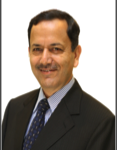
#BUCPUA Professor Details the Unethical Political Pressure Facing Urban Planners
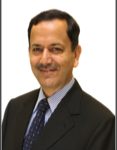
Tej Karki, Ph.D., is an urban planner originally from Nepal whose expertise ranges from politics of urban planning implementation, climate change and its impact on cities as well as sustainable urban planning. He is a professor at Boston University’s Metropolitan College in the City Planning and Urban Affairs program where this spring semester he is teaching special topics course Urban Sustainability and Climate Change. Recently, Dr. Karki has written an academic piece “What Should Planners Do to Address Unethical Political Pressure?”, where he discusses the use of coercion experienced by city planners to carry out the needs of politicians regardless of the social and ethical implications. The piece uses examples of city planners in Nepal – due to his personal experience as well as additional interviews and research conducted – as case studies to address the different strategies that urban planners may perform to fight against this political pressure. Below follows an interview that allows one to better understand the motivation behind the piece as well as the greater impacts of unethical political pressure.
Cecilia: Was there any particular event that motivated you to write this piece?
Karki: I was a civil-servant planner in Nepal for many years. In one land development project, when 95 percent of landowners wanted to finish the fieldwork faster, and the remaining 5 percent never agreed despite providing several possible concessions, I had to intervene and start the fieldwork. Local politicians backed those remaining 5 percent of landowners. As a retaliation to my intervention, they were able to transfer me from that position to another department. This is just one, but there are many such examples. Now, after entering into the academic world, when I reflect back, I found unethical political pressure the hardest part in the planning profession, particularly for civil-servant planners, and I started thinking more on it and started searching literature and finally, I was able to write this piece.
Cecilia: Was there any particular reason you picked Nepal as the main case study for this piece?
Karki: First, I chose Nepal because I thought I am familiar with the type of political pressure there and could capture the planners’ story and context very well. Second, most planning stories and literatures are only from the US and Europe, very thin literature from the developing world. For decades people are citing John Forester and Charles Hoch’s planners’ story from the US and no new things were coming, so my interest was to familiarize Nepal’s case to the US and EU readers. First, I had sent the article to the Journal of American Planning Association (JAPA) for publication, but they did not like the Nepalese story (they probably trust or think that only local scholars are superior). Thanks to the Planning Practice and Research journal, they finally liked it and it got published. Now, I can say that I have finally succeeded taking Nepal’s story to the US and EU readers.
Cecilia: Do you believe there is a difference in the level of unethical political pressure experienced by urban developers in developed and developing countries?
Karki: Most human beings have a tendency to maximize self-interest by crossing ethical limits as far as they can. In this sense, it is the same in both the places (Professor Charles Hoch has written that US planners were bribed and threatened to do unethical work). Only the strict legal and social rules can contain their unlimited unethical wishes. In the developed world, the rules are strict and effective, media is sensitive as well, as a result, the pressure is cautiously applied, but in the developing world, the politicians are more open and care free or a little bit shameless in applying unethical pressure. So, it is the planners’ common problem all over the world.
Cecilia: Are there social components to these strategies that allow each one of them to be more influential than others in specific countries?
Karki: I partially answered this above. Yes, the level of social norms and values, media and law can determine the pressure and the planner’s ability to cope with it. Just one example I want to cite is that the most Chinese planners can in no way dare go against the city mayor’s views, even if it has drawbacks. The planners just show blind loyalty. Political regime type and a culture that believes that disagreeing with a senior person or boss is disrespectful, also matters.
Cecilia: Are there any other strategies you have come across in your research that urban planners have used to escape unethical political pressure?
Karki: You cannot escape, you have to make choices: either show blind loyalty like the Chinese planners or try to educate the pressure-maker to change his mind. If you cannot do either of this, then leave the job (use threat to exit or resign). It is context and situation dependent. There are stories where one man eats the other in the desert when they have no food many days. So, adaptive strategy perhaps may be needed, like the tortoise head: be ethical as long as you can (take out your head from the body) if you cannot then hide your head inside your body until next opportunity arises, if your shell (tortoise) is strong enough to withstand the pressure. If not, exit from the job. Some call this practical judgment.
Cecilia: Would you say that the political pressures explored in your piece are also the main sources of political pressure in the United States?
Karki: Yes of course. There were literatures about planners facing pressure here in the US. For example, in cases where planners were ordered to draft exclusionary zoning codes to exclude low income families from the town, very few resigned; those who resisted were fired in some cases; and those who accepted survived. There are cases where entire planning departments and planners were fired to serve the private interest because the planners refused to go against the zoning code to serve the private interest. Some of the examples, I have shown in my article. Because the rational planners did not pay attention to the dynamics of these pressures (focused only on their work), they were shocked and surprised, and they don’t know what to do for such unexpected unethical pressures. So, I have put these in perspective in my article and then focused on Nepal’s case.
Cecilia: In your opinion, which practical judgment action would work best in the United States?
Karki: One thing I did not write in this article is how prepared a planner should be beforehand for a possible and unexpected political pressure. Planners should, anticipate and should have plan A, B and C for any possible political pressure. Colonel John Boyd has invented a theory: Observe, Orient, Decide and Act. Planners should observe (watchful on who are the political pressure groups and who are controlling them), then orient yourself (reposition) decide a course of action and act. This practical judgment makes them better, and I am planning to write based on Boyd’s theory in future.
Cecilia: Can you give me a brief description of your course UA 510 this semester?
Karki: UA 510 deals with the impacts of urbanization, globalization and climate change on cities and presents ways to deal with those impacts. It prepares planners on how to deal with a climatically and politically turbulent world (cities grappling with frequent floods, storms and droughts). This course tells students how town mayors driven by profits and private interests exert unethical political pressure to planners to approve unsustainable development projects (reject solar and windmills to favor coal fired electricity and fossil fuel) and what practical judgment they could apply.
Cecilia: With your expertise in global warming, do you think it will be possible to see an increase in the political pressures urban developers experience?
Karki: The level of awareness on global warming and sea level rise is very high worldwide, and this might reduce pressure to push unsustainable projects. But more work need to be done at the local level. For example, the city of Miami is sinking, and the city is trying to raise the ground level of the whole city, but at the same time there are congressmen and politicians who say global warming is not happening. In many other places, there are private interests who do not want to compromise short-term profits over long-term climate change impacts (like tragedy of commons). This is the area where planners would still continue to feel unethical pressure for car and oil, over train or bicycle.
You can read more about Dr. Karki’s background here.
-Cecilia de Almeida, CAS’19
Department of Applied Social Sciences Celebrates Diversity Through Latin-Themed Party
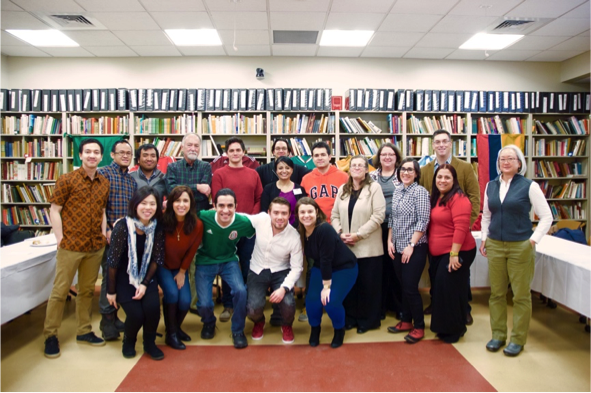
On Friday, February 17, BU Metropolitan College’s City
Planning and Urban Affairs, Gastronomy, and Criminal Justice students and faculty kicked off the spring semester with a Latin-themed party hosted by the Department of Applied Social Sciences. The afternoon brought together the diverse community of students from the Metropolitan College to enjoy Venezuelan food, Latin music, salsa dancing, and lively conversation.
Professor and Chair of Applied Social Sciences Daniel LeClair commented “It’s a good honor for our international students and creates a sense of community. It shows how many students are from Latin America.”
Luis Quintanilla (Master of City Planning ‘17) said that the event was “organized with the intention to show Latin American culture and flavors as well as its colors, flags, soccer shirts, and music, with the hope that everyone present enjoys it.”
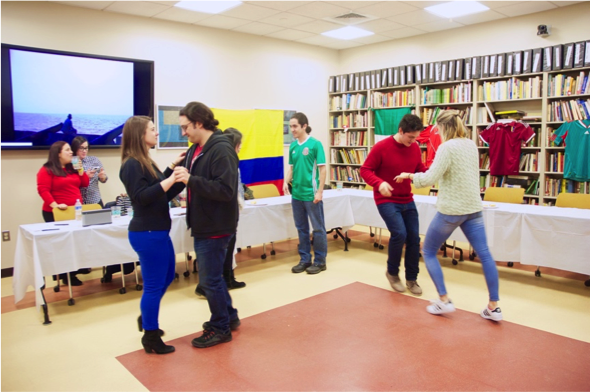
The event also featured an array of Venezuelan cuisine. “These are the most typical foods in Venezuela,” Diego Lomelli (Master of City Planning ’18) said as he began to introduce the arepas, patacones, and tequeños from local Venezuelan restaurant Los Chamos.
Alejandro Delgado (Master of Urban Affairs ’17
), was in charge of selecting the Latin American music and videos playing in the background. Delgado shared that last year, the Celebrating Diversity party happened during Chinese New Year and explained that the idea of this year’s party was sparked by a conversation last year with associate Professor of Practice and Director of City Planning and Urban Affairs, Madhu C. Dutta-Koehler. “Madhu and I were talking last Christmas and I said, ‘Why don’t we do Latino?’”
As more people streamed into the room, some students broke up in pairs and started swaying and salsa dancing to the beat. “Everybody’s dancing, it looks really fun!” Sydney Manning (Master in Gastronomy ‘19) said.
“It’s a good opportunity to encourage students to meet and share information about classes and cultures. You start to think about America and Latin American cities and I think that comparison is amazing,” said Cristian Casanueva (Master of City Planning ‘18).
- Savannah Wu, CAS ‘19
Boston Urban Symposium Teams Up for the Spring Semester!
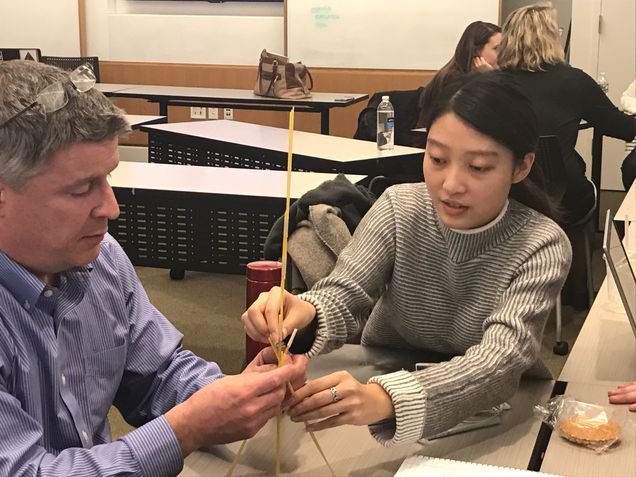
Professor Yesim Sungu-Eryilmaz’s Boston Urban Symposium class kicked off the spring semester by participating in the Spaghetti Marshmallow Challenge, a team building exercise with the goal of revealing innate personality traits about different team members in a group, as well as highlighting the different roles members undertake and overall group dynamics. The importance of team building is particularly pertinent in this capstone course that centers on a semester length group project focusing on topical issues that involve the greater Boston metropolitan area.

For the challenge, the class of was divided into groups and given 18 minutes to create a freestanding structure using only spaghetti, tape, and string. The conditions were simple, the structure had to support the weight of the marshmallow and be as tall as possible without collapsing. After a quick a brainstorming session, most of the teams came to the same conclusion of building a structure with a triangular base in which they could support the marshmallow. In the end, only one group prevailed and managed to get an actual standing structure.

The challenge brought up important questions about how urban planners can cooperate with each other to meet a common goal, whether that be getting the marshmallow to the tallest point, or developing policies that will increase standards of living for the citizens of Boston in a way that is both sustainable and realistic.
The Boston Urban Symposium is a capstone spring semester class that has a focus on interdisciplinary learning in the field of urban development and city planning. The theme for the class changes every spring, but professionals and guest speakers are always invited to talk about their past experiences and share the challenges they’ve had to overcome in their field.
This spring's Boston Urban Symposium focused on Equitable Development in Opportunities in Boston's Transit-Rich Neighborhoods. For more information, visit the project website and view the presentation.
- Cecilia de Almeida, CAS ‘19